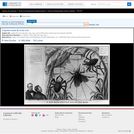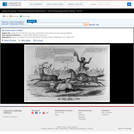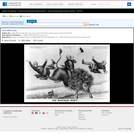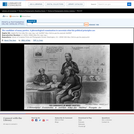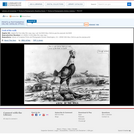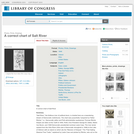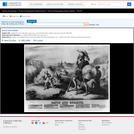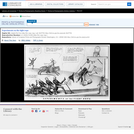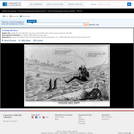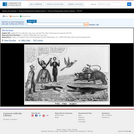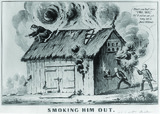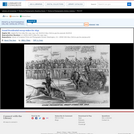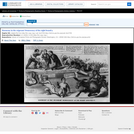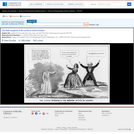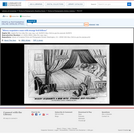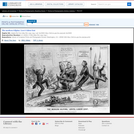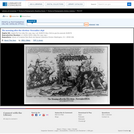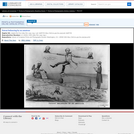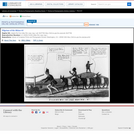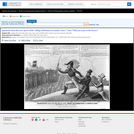A comic scene ridiculing the Tammany Democrats of New York City. Tammany headquarters, known as the "Wigwam," here erupts in a drunken fracas over the Democratic platform for the presidential race of 1852. The platform specifically endorsed the Compromise of 1850, which incorporated the Fugitive Slave Act, a measure highly repugnant to abolitionists and Free-Soil or Barnburner Democrats. The artist also capitalizes on current rumors of candidate Franklin Pierce's bouts of alcoholism. In the center stands a wooden platform, in the process of collapsing on one end under the riotous exertions of abolitionists. On the other end (at left) stand Pierce and his runnning mate William R. King. Pierce, visibly drunk and swooning, is supported by King. Yet he tries to speak, "Fel-er-cit-zens. I'm bliged to you. I, that is--King? did you put that "Bri" (hic) "Bri" (hic) "Brick!" (damm the word)--in my "Hat?" Fel--citizens? this is my mot (hic) mottoe! "Prin-Ci-Ples, Not, Men--Men, Not Prin-ciples" whichever is the most ex (hic) "Expedient" (damm the word). Fel-Cit-zens? hurray for the Dem (hic) Dem (hic) "Democratic Party." (damm the word) (hic) (hic) ah that last "Brandy Smash" was too Muscular for my constution. "King! King!" your drunk" King: "Come--Pierce stand up like a man, what will your friend think, if you are as limber as this after we get you in the White House, what will become of the country. Come now? stand up, or lay down, one or the other." King leads Pierce toward an Irish tough (far left), one of the party rank and file, who steps onto the platform and declares enthusiastically, "Your the boy for this crowd! slap down yer paw! . . . aint we a go in ter have a nice time when we gitm you in the white house? well we is! hoss! wont we lick Mexico again? wont we go ter Cuba and kiss the purty Spanish galls? wont we lamm the British? & Choke Louis Napoleon? well we will! . . ." The platform itself is inscribed with the warning: "In consequence of the Ricketty Construction of this Platform, all Barnburners, Free-Soilers, & Abbolitionists are requested to Tread on it as lightly as possible." The structure breaks up on the right amid a crowd of brawling Democrats, one of them carrying an "Abbolition" banner. In the left foreground, a muscular, bare-chested "Old Hunker" (conservative Democrat) sends a Free-Soiler flying with a punch, saying, "How do you like that for a Change?" To which the Free-Soiler answers, "I should like it better without the change?" In the center sits a man in athletic costume holding a bottle. He looks to the right where Whig candidate Winfield Scott enters on the back of a donkey. The athletic man says, "Hulloa? Scott! is it a fact that you brought down--twelve "Birds" at one "Shot." Scott, dressed as a hunter, with a large sack slung over his saddle, replies, "Yes Sir, brought e'm "Down," and "Bagged" e'm too." As in "Terrible Rout and Total Destruction of the Whig Party" (no. 1852-26) the comic characterization and style of draftsmanship here are unquestionably John L. Magee's, and compare closely with other, signed works by the artist.|Drawn by John L. Magee.|For sale by Nathaniel Currier at No. 2 Spruce St. N.Y.|Title appears as it is written on the item.|Weitenkampf, p. 111.|Forms part of: American cartoon print filing series (Library of Congress)|Published in: American political prints, 1766-1876 / Bernard F. Reilly. Boston : G.K. Hall, 1991, entry 1852-13.
